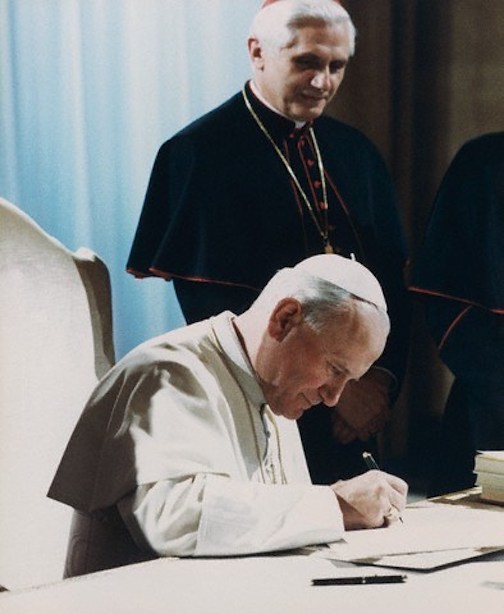In life, we see two currents. The Lord Jesus described them as two paths: the wide way and the narrow way. Saint Paul developed this notion further by describing the battle between those with fleshy hearts and those with spiritual hearts. Saint Augustine, the spiritual protégé of the Apostle to the Gentiles, crafted a whole theology based on two cities: the City of God and the City of Man. Echoing the Lord’s wisdom, the Doctor of Grace saw that the two cities were formed by two different loves. One city sought to love God, His law, and our neighbor – while the other city was stuck in narcissism.
Pope Saint John Paul II translated these notions into more contemporary language. In his monumental 1995 encyclical Evangelium Vitae (in several respects, a substantial and amplifying “sequel” to Pope St. Paul VI’s earlier Humanae Vitae), the beloved pontiff coined terms now common to a deep Catholic understanding of our times: the culture of life and the culture of death. In these expressions, the saint-pope was once again showing that there are two paths and two loves in life. These paths and the loves they denote give rise to not only “cities,” but also cultures. They mutually feed on their own loves.
The culture of life calls all of us to a higher and more sacrificial service to God and neighbor, especially to the most vulnerable and needy among us. Grounded in a love for all people, the culture of life believes, lives, and labors to spread the message that all people have dignity, all people are a divine gift, and all people – however marred by original and personal sin – are to be cherished, respected, and esteemed.
This assertion is an irritant to the culture of death. That culture hates the message, despises its messengers, and seeks to strip dignity and respect – while professing to do the opposite – from the most vulnerable and weak among us.
Despite these indications of a bad conscience, the culture of death, therefore, worries only about itself and its desires. It seeks to destroy whatever is inconvenient or uncomfortable. The weak or vulnerable are easy prey in such a culture.

In addition to fueling its own love of God and neighbor, therefore, a robust culture of life must also seek to expose and fight the culture of death. Such a battle is inevitable, and those who follow a strong culture of life understand its necessity. As such, it labors to dismantle the arguments, weaken the seduction, and disable the influence and structures of an anti-life culture.
In Evangelium Vitae, Pope Saint John Paul II rightly identified a “conspiracy against life. . . .This conspiracy involves not only individuals in their personal, family or group relationships, but goes far beyond, to the point of damaging and distorting, at the international level, relations between peoples and States.” [12]
The roots of the conspiracy lie in Lucifer’s Revolt against God. The Evil One spread that rebellion was spread by the lies he told to our first parents and their sin in the Garden of Eden. This culture of death led to the murder of their son Abel by his brother Cain. That fratricidal act led to even greater offenses to human dignity.
And so, the stage was set. The options became clear, and people, cities, and cultures had to make a choice for life or death. And those who choose life must be willing to fight in its defense.
The battle over life was historically a one-front battle. The envoys of the culture of death attacked the unborn. They denied their personhood. They labeled them as undesirables. They undertook a war of words – “transvalued” and redefined autonomy, dignity, and choice to support their fallen efforts. In particular, they waged a war in the womb against those with special needs, especially those with Down Syndrome.
But the culture of death feeds on itself. It is not satisfied with a one-front battle. And so, the battle has become a two-front war, with the end of life now being thrown into the assault.
News reports are filled with children being denied end-of-life care, patients such as Vincent Lambert, who died recently in France after being refused food and water. And we hear of states such as Maine adding new laws to facilitate physician-assisted suicide.
The war of words has given rise to new definitions of words such as burden, quality of life, and even mercy.
Now is the time – as the attacks against life are advanced and broadened – for people of life to be more creative, more active, and more assertive in retaining the proper context and definition of words, in giving witness to selfless care for the weak and vulnerable, to protesting and seeking the changing of anti-life laws, and to sharing with fellow parishioners, neighbors, and co-workers the beauty and objective dignity of all human life.















